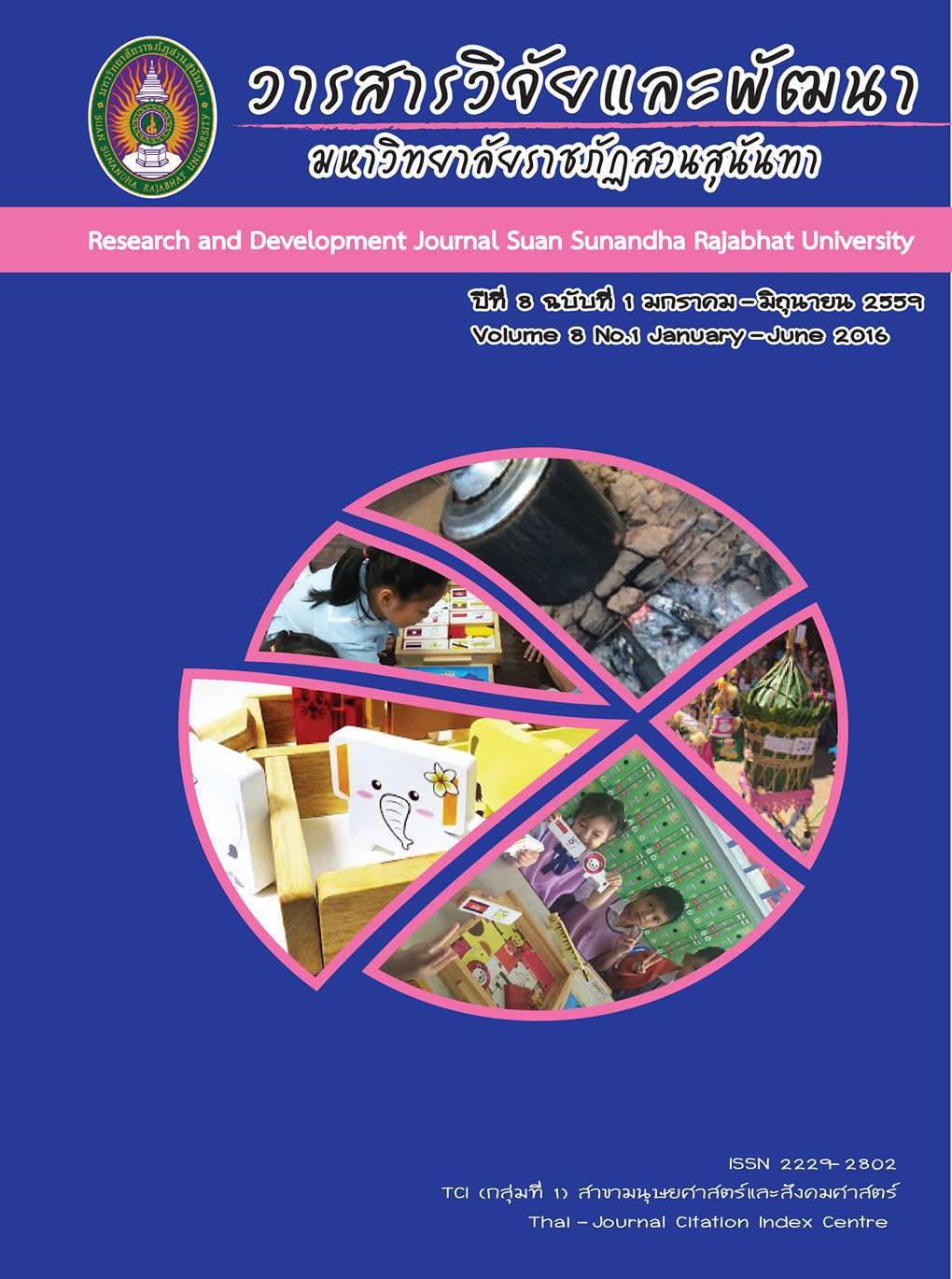การศึกษาเรื่อง ความรับผิดชอบต่อสังคม ความไว้วางใจ ที่มีอิทธิพลต่อ ความจงรักภักดีของผู้บริโภคผลิตภัณฑ์ในกลุ่มอุตสาหกรรมประเภทพลังงาน
คำสำคัญ:
ความรับผิดชอบต่อสังคม, ความไว้วางใจ, ความจงรักภักดีอุตสาหกรรมพลังงานบทคัดย่อ
งานวิจัยนี้มีวัตถุประสงค์เพื่อ 1)การศึกษาเชิงปริมาณครั้งนี้มีวัตถุประสงค์เพื่อศึกษาอิทธิพลด้านความรับผิดชอบต่อสังคมและความไว้วางใจที่มีผลต่อความไว้วางใจต่อลูกค้าในกลุ่มอุตสาหกรรม
พลังงาน 2) เพื่อศึกษาถึงบทบาทของตัวแปรคั่นกลาง (ความไว้วางใจ) ที่มีอิทธิต่อความสัมพันธ์ระหว่างความรับผิดชอบต่อสังคมและจงรักภักดีของลูกค้าในกลุ่มอุตสาหกรรมพลังงาน
การศึกษาครั้งนี้เป็นการสำรวจข้อมูลโดยใช้แบบสอบถามเป็นเครื่องมือในการเก็บรวบรวมข้อมูลประชากรที่เป็นกลุ่มตัวอย่างในการวิจัยครั้งนี้เป็นผู้บริโภคผลิตภัณฑ์ในกลุ่มอุตสาหกรรมประเภท
พลังงาน จำนวน 222 คน โดยอาศัยหลักในการเก็บข้อมูลแบบเป็นระบบ (Systematic Sampling)สถิติที่ใช้ในการวิเคราะห์ข้อมูล คือ ค่าร้อยล่ะ ค่าเฉลี่ย ค่าเบี่ยงเบนมาตรฐาน และใช้สถิติในการทดสอบ
สมมติฐานคือสถิติเชิงอ้างอิง วิเคราะห์ถดถอยอย่างง่ายและการวิเคราะห์การถดถอยพหุคูณ (MultipleRegression Analysis) โดยเฉพาะการทดสอบในการวิเคราะห์อิทธิพลของตัวแปรคั่นกลาง ผลการวิจัยพบว่าผู้บริโภคผลิตภัณฑ์ในกลุ่มอุตสาหกรรมประเภทพลังงาน มีการรับรู้เกี่ยวกับความรับผิดชอบต่อสังคมและความไว้วางใจมีอิทธิพลต่อความจงรักภักดีของผู้บริโภคผลิตภัณฑ์ในกลุ่มอุตสาหกรรมประเภทพลังงานอย่างมีระดับนัยสำคัญ 0.05 และความไว้วางใจมีอิทธิพลต่อความสัมพันธ์ระหว่างความรับผิดชอบต่อสังคมและความจงรักภักดีเพียงบางส่วนเท่านั้น
เอกสารอ้างอิง
Effects of the EU Substances
Police. (n.p.): Wiesbaden.
Bitner&Hubbert. (1994). "Encounter
satisfaction versus overall
satisfaction versus quality," In R. T.
Rust & R. L. Oliver (Eds.), Service
Quality: New Directions in
Theory and Practice (p.72-94).
Thousand Oaks, CA: Sage.
Bitner. (1992). Servicespace: The impact of
physical surroundings on customer
and employees. Journal of
marketing, 56(21), p.57-72.
Bourdeau& Leigh Brian. (2005). A New
Examination of Service Loyalty:
Identification of the Antecedents
and Outcomes of Additional
Loyalty Framework. Dissertation,
Ph.D. (Business Administration).
Florida: Florida University.
Photocopied.
Brown, S.W. (1991). Gummesson,E,
Edvadson,B & Gustavasson B.
Service Quality: Multidisciplinary
and multinational Prepective.
Massacuetts: Lexington Books
Kritsanarungsan, A. (2009). Trust and
Trustworthiness. [Retrieved 5
August 2 0 1 0 ]
[www.novabizz.com]Baron, R. M., &
Kenny, D. A. 1986. The ModeratorMediator Variable Distinction in
Social sychological Research:
Conceptual, Strategic, and
Statistical Considerations. Journal of
Personality and Social Psychology,
51(6), 1173-1182.
Morgan, R. M., & Hunt, S. D. (1994). The
commitment-trust theory of
relationship marketing. Journal of
Marketing, 58 (3), p.20–38.
Nunnally, J. C., & Bernstein, I. H. 1994.
Psychometric Theory (3rd ed.).
New York, McGraw-Hill.
Stern D. I. (1994) Historical pathdependence of the urban
population density gradient, The
Annals of Regional Science 28,
197-223 and 27 (1993), 259-285.
Thaipatana Institution. Model Scheme of
CSR. [Retrieved 11 November 2014]
Tiyao, S. (2008). Fundamentals of
Management. (4thed). Bangkok.
Thammasat University.
Tungjakwaranon, P. (2008). Brand Making
of Kellogg. Bangkok: Amarin Printing
and Publishing
Vlachos, P. A., Tsamakos, A.,
Vrechopoulos, A. P., &Avramidis, P.
K. 2009. Corporate Social
Responsibility: Attributions, loyalty,
and the Mediating Role of Trust.
Journal of the Academy of
Marketing Science, 37, 170-180.
Wiriyapipat, N. (2009). Entering to CSR
Trend: Preparation to ISO 26000.
Academic Journal of University of
Thai Chamber of Commerce. 29
(3), 195.
Yamane. (1967). Statistics: An
introductory analysis. New York:
Harper and Row.
Yoonpratom, A. (2007). CSR Story from
Idea to Practice.
ดาวน์โหลด
เผยแพร่แล้ว
รูปแบบการอ้างอิง
ฉบับ
ประเภทบทความ
สัญญาอนุญาต
บทความที่ได้รับการตีพิมพ์เป็นลิขสิทธิ์ของ สถาบันวิจัยและพัฒนา มหาวิทยาลัยราชภัฎสวนสุนันทา
ข้อความที่ปรากฏในบทความแต่ละเรื่องในวารสารวิชาการเล่มนี้เป็นความคิดเห็นส่วนตัวของผู้เขียนแต่ละท่านไม่เกี่ยวข้องกับมหาวิทยาลัยราชภัฎสวนสุนันทา และคณาจารย์ท่านอื่นๆในมหาวิทยาลัยฯ แต่อย่างใด ความรับผิดชอบองค์ประกอบทั้งหมดของบทความแต่ละเรื่องเป็นของผู้เขียนแต่ละท่าน หากมีความผิดพลาดใดๆ ผู้เขียนแต่ละท่านจะรับผิดชอบบทความของตนเองแต่ผู้เดียว





